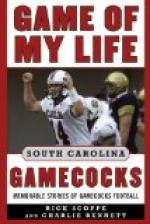The master of the murdered negro was still ignorant of his death; he was in hopes that his slave would return. But finding that his slave did not return as expected, the master became uneasy, and offered a reward to any one who could give a clue of his negro. In the meantime, he discharged the overseer who had been the cause of his slave running away; and he also kept the overseer’s salary of four hundred dollars, which was the annual pay for overseering his plantation.
Mr. Black’s house was in Richland county, and as he was the last who had hunted runaway slaves in Barnwell county before the murder, suspicion rested on him. Still no one said anything to him, but he was very closely watched by men of his own county, whose interest was not in the hatefulness of the crime committed, but rather in the reward offered by the master to any who could give information of his runaway slave.
Sometime after the case had occurred, another white man of Richland county became quite a friend to Mr. Black, the slave hunter; this apparent friendship soon led Mr. Black to tell the secret, which speedily brought him to trial. While he and his pretended friend were on a drinking spree, in the midst of the merriment,—of course the conversation was how to control negroes, as that was the principal topic of the poor white men South, in the days of slavery.
In the conversation, this friend spoke of several plans which he said, if properly carried out, “would keep a nigger in his place.” After the friend had said so much to Mr. Black, the slave hunter, the latter felt that he could tell his secret without endangering himself, so he answered: “The way to show a nigger that would resist a white man, his place, is to put him among the missing. Not long since, I went to Barnwell county to hunt a runaway nigger, and my dogs struck trail of another instead of the one I wanted to capture. After quite a long chase my dogs ran him down, and before I reached him he killed several of them, and gave me a hard fight when I got to him. Motley and I were together; I shot him down, and Motley and I cut him up and gave the pieces to the remainder of my dogs; that is the way I put a nigger in his place.”
After the secret had been revealed, Mr. Black’s friend excused himself, and the former saw him no more until he appeared as a witness against him. The companion of the murdered negro was summoned to carry the investigating party, including the murderer, to the spot where his companion had been buried.
Mr. Black was tried and found to be guilty. After sentence had been passed, he confessed the commission of that crime, and also told that he had killed several runaway negroes previously in his own county. So Mr. Black and Motley, his companion, were both hanged in Barnwell county, S.C. The system of slavery outlived Mr. Black, the slave hunter, just six years.




